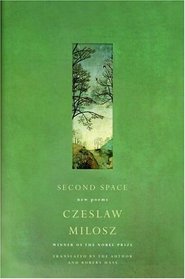Funny. The musings of people who, near death, begin to question all they have believed. Perhaps that is not entirely true, perhaps Milosz raised these questons before, but is just now acknowledging them. At any rate, he denies approaching death as the provocation for these musings on the antagonism of reason and emotion (religion), since he first questioned his beliefs in high school.
But it is funny to me, since I questioned all these things so long ago myself and was able to decide those things, teachings about God, and divinity, and angels, and devils, and the Trinity versus a view that Christ was just the appproachable form of Jehovah, which he refers to as an ongoing theological debate. Hah. Between who? The born-again evangelicals defend Jesus as God himself, so they fall on the opposite side of that debate with Roman Catholics. A minor sideline in his musings on faith. There is, of course, much more, and it is in his references to women and longing and loss that I could see a man, not a christ man. Perhaps that was his intent. He is a more learned man than I, a polyglot, and able to think and write in those languages, and he was awarded a Nobel for literature, and taught at U of C in Berklely, and was a member of the American Academy and Institute of Arts and Letters. His unversed poem, MERCHANTS was one that I enjoyed, and will remember, since it exhibits his internal theological debate. The poem speaks of unquestioned miracle, but also condemns those who: "...rub their hands, reckon, add to their inventory new supplies of crucifixes or nickel coins imprinted with effigies of popes." Faith, yet with a Christ-like disdain for those who profane or ignore faith.
But it is funny to me, since I questioned all these things so long ago myself and was able to decide those things, teachings about God, and divinity, and angels, and devils, and the Trinity versus a view that Christ was just the appproachable form of Jehovah, which he refers to as an ongoing theological debate. Hah. Between who? The born-again evangelicals defend Jesus as God himself, so they fall on the opposite side of that debate with Roman Catholics. A minor sideline in his musings on faith. There is, of course, much more, and it is in his references to women and longing and loss that I could see a man, not a christ man. Perhaps that was his intent. He is a more learned man than I, a polyglot, and able to think and write in those languages, and he was awarded a Nobel for literature, and taught at U of C in Berklely, and was a member of the American Academy and Institute of Arts and Letters. His unversed poem, MERCHANTS was one that I enjoyed, and will remember, since it exhibits his internal theological debate. The poem speaks of unquestioned miracle, but also condemns those who: "...rub their hands, reckon, add to their inventory new supplies of crucifixes or nickel coins imprinted with effigies of popes." Faith, yet with a Christ-like disdain for those who profane or ignore faith.




